Results
-
 £73.10
£73.10Brule River Celebration - Robert Sheldon
Envision a musical sleighride through the upper peninsula of Michigan. Playful and energetic, the opening evolves into a plaintive and sensitive segment of the piece that provides great contrast and expressive opportunites. This exceptional piece has several solo passages for alto saxophone, piccolo, flute, oboe, trumpet and clarinet, and is an excellent choice for concert or contest use. Includes a Piano/Keyboard part that adds color to the composition and allows you to feature a budding pianist with your group.
Estimated delivery 7-14 working days
-
 £73.10
£73.10Classical Rondo - Antonio Capuzzi
Originally composed for solo double-bass and orchestra, the latest addition to the Barnhouse "Spotlight" series presents almost endless opportunities for featuring your soloist with concert band or a small wind ensemble. Parts are included to provide solo instrument options for any wind (or string) instrument in C, Bb, Eb, F, or bass clef. The accompaniment may be performed with full band: or, for balance purposes while accompanying string or higher woodwinds, it may also be performed by a smaller wind ensemble of flutes, oboe, clarinets, bass clarinet, bassoon, horns, and timpani. An excellent way to feature your star player or a guest artist!
Estimated delivery 7-14 working days
-
 £75.20
£75.20Hungarian Rondo - Carl Maria von Weber
Composed by Carl Maria von Weber for solo viola with orchestra, the "Hungarian Rondo" has become a standard repertoire bassoon solo. This edition offers a choice of soloist, including bassoon, bass clarinet, euphonium, or tuba. The band setting is carefully arranged to require a minimum of preparation time, and is playable with either full concert band, or if accompanying a soloist requiring greater presence, just woodwinds and horns. The finale includes an ossia part as well as the original. An excellent piece to feature a guest artist or outstanding soloist with your band!
Estimated delivery 7-14 working days
-
 £113.30
£113.30Moderate Dances - Angelo Sormani
This piece is a tribute to dance music, especially passionate, intense and meditative dance music. "Moderate Dances" is divided into three movements: a "Tango", a "Slow Waltz" and a "Bossa Nova". Each movement and each dance has its own particular characteristics but, when combined, these different rhythmic beats and times give the piece a feeling of completeness and uniformity. The Tango started to flourish in the suburbs of Buenos Aires in around 1880. There is still some doubt as to its origins, which may be Cuban (Habanera) but are probably African. It was most popular in Argentina and Brazil: here the male protagonist was originally the "gaucho" with his inseparable guitar, later to be replaced by the proud, elegant "compadre". By around 1910 the Tango had spread to Italy and France. New clubs opened, where the upper classes could watch and dance the Tango. Here the dance also underwent some rapid transformations. The exaggerated and extravagant gestures and body movements disappeared. Slow, gliding steps replaced the old rotational movements. The women's red ankle-boots and the partners "staring into each other's eyes" accentuated the erotic nature and sensuality of this dance. So much so that, in 1913, the German government banned soldiers from dancing the Tango. Those who broke the law were immediately discharged from the army. From a strictly musical perspective, the basic instruments were a flute, a harp (the diatonic harp typically played by the Indians of Paraguay) and a violin, or flute, guitar and violin or even clarinet, guitar and violin. These instruments were easy to transport, ideal for playing at parties, in the streets and in courtyards. The musicians played by ear, frequently improvising: there were no scores, no records, which is the main reason why it is impossible to trace the Tango back to its exact origins. However, the Tango's evolution (and growing popularity) was once again fostered by its fundamental ability to absorb "other" cultures, languages and sounds. And it was the arrival of the "bandoneon" (an accordion-like instrument that was invented in Germany and brought to Rio de la Plata by some immigrant), which replaced the flute, that marked the beginning of the Tango's huge success outside Argentina. A number of talented composers, above all the great Astor Piazzola (1921-1992), transformed the bandoneon from a simple accompanying instrument to a solo instrument that was to become the distinguishing feature of the 20th century Tango. The Slow Waltz originated from the Waltz, the typical dance of the Bavarian and Tyrolese peasants in the 1700s. It was composers like Johann Strauss, father and son, who carried the Waltz to its zenith in the 1800s, creating the sensual and melancholy yet joyful and charming dance we are all familiar with. When the Waltz first became popular in Germany, the members of respectable society were shocked at the closeness of the dancing partners, who had always previously danced apart. The main difference between the Waltz and Slow Waltz is that the latter has a slower, more expressive rhythm: the men wear tails and the women wear ball gowns decorated with beads and feathers and couples dance in graceful rotational movements. "Bossa Nova" is the title of the last movement in the piece. Jobim, the great Brazilian musician, described this musical genre as a combination of modern Jazz and Samba. Bossa Nova means "new wave". This was the name of the artistic and musical movement that evolved in Brazil in the late Fifties and was extremely popular throughout the Sixties. The songs are usually about love or social matters, drawing inspiration from the slums of Rio De Janeiro and the lives of their inhabitants. Bossa Nova, with its original compositions and the artistic talent of its musicians, also became hugely popular in the United States and Europe, and top Jazz musicians (Ella Fitzgerald, Stan Getz, Bob Cooper, Charlie Bird, Sonny Rollins, Dexter Gordon, Dizzy Gillespie) started to include Bossa in their repertoires.
Estimated delivery 7-14 working days
-
£68.99
Reeds of Distinction - James L. Hosay
A major piece to feature your Clarinet section! James L. Hosay has used his considerable compositional skill beautifully in creating this exuberant new offering for your band. It's a great showpiece for your reeds, but it leaves no one behind when the fun begins.The Baroque and Classical underpinnings of this original composition open the door for a wonderful educational encounter for everyone, while a critically important part of the band gets the special exposure it deserves.Effervescent!
Estimated delivery 7-14 working days
-
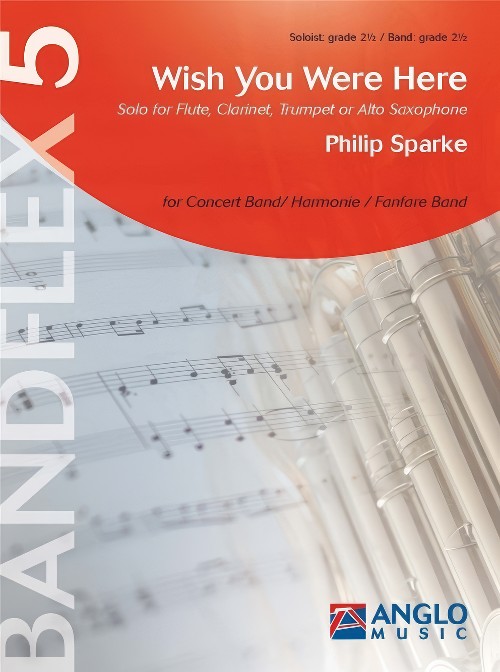 £59.99
£59.99Wish You Were Here (Flexible Solo with Flexible Ensemble - Score and Parts)
A chance to feature a star soloist! The solo part can be played by either flute, clarinet, alto sax or trumpet. The band can also benefit by learning the importance of accompanying sympathetically.Duration: 2.30
Estimated delivery 7-14 working days
-
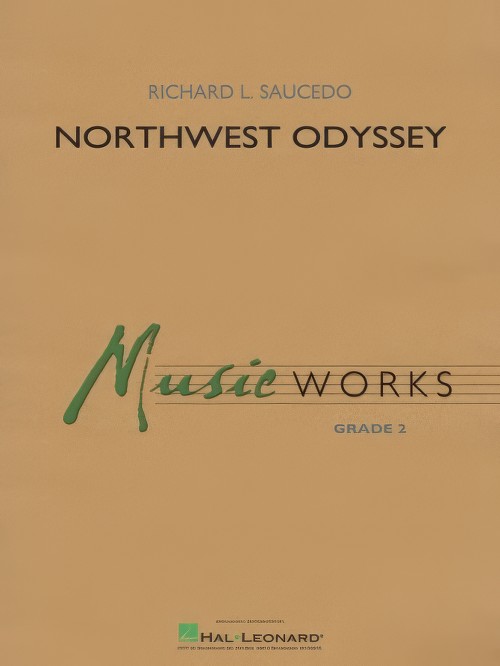 £57.50
£57.50Northwest Odyssey (Concert Band - Score and Parts) - Saucedo, Richard L.
Combining a driving and rhythmic pulse, carefully paced mixed meters, and full band passages interspersed with percussion feature spots, Northwest Odyssey provides a rewarding and dynamic experience for young players. A brief slow middle section features a dialogue between three soloists (Clarinet, Flute, Alto Sax) before returning to the opening fast pace and exciting finish.
Estimated delivery 7-14 working days
-
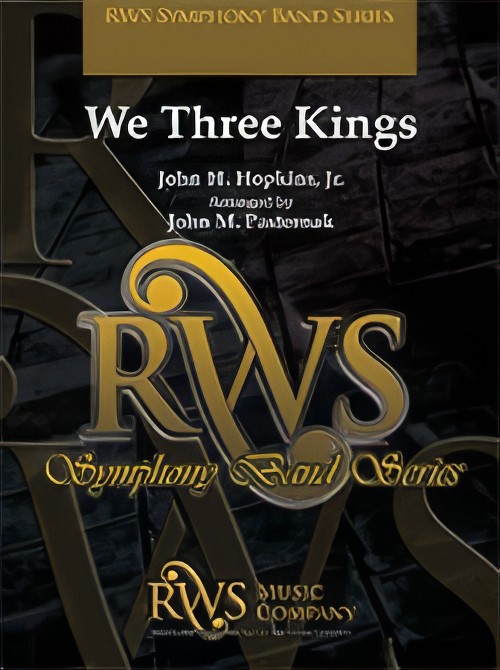 £99.00
£99.00We Three Kings (Concert Band - Score and Parts) - Pasternak, John M.
This contemporary setting of "We Three Kings" is sure to liven your holiday concert. Featuring cleverly syncopated rhythms, a clarinet section feature, and a driving percussion section, John Pasternak's creative arrangement will find a place in your regular holiday concert repertoire. Highly recommended! Duration: 2.45
Estimated delivery 7-14 working days
-
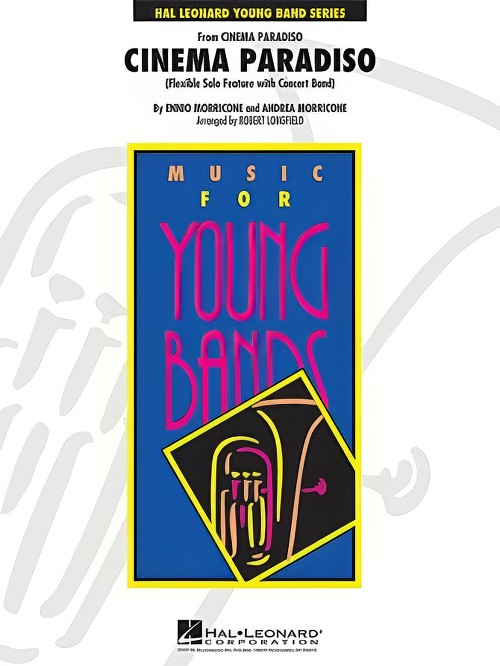 £60.99
£60.99Cinema Paradiso (Flexible Solo with Concert Band - Score and Parts)
Solo for oboe, flute, clarinet, alto sax or trumpet.From the classic 1988 film Cinema Paradiso, this beautiful theme has been recorded by artists ranging from trumpeter Chris Botti to violinist Joshua Bell. This wonderful setting by Robert Longfield allows you to feature your choice of solo instrument with full band accompaniment.
Estimated delivery 7-14 working days
-
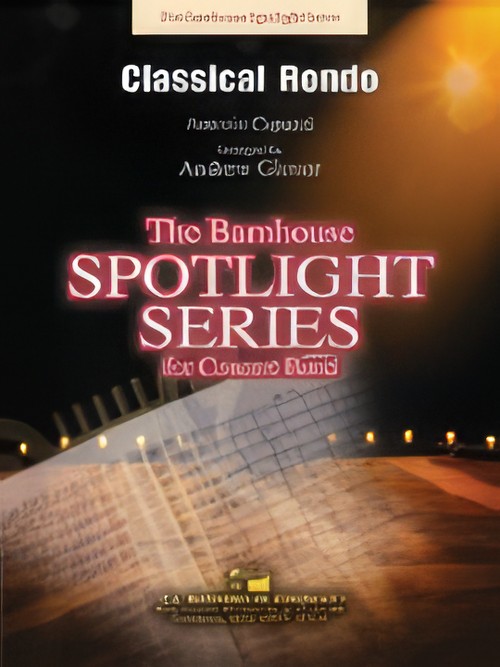 £72.00
£72.00Classical Rondo (Flexible Solo with Concert Band - Score and Parts)
Originally composed for solo double-bass and orchestra, the latest addition to the Barnhouse "Spotlight" series presents almost endless opportunities for featuring your soloist with concert band or a small wind ensemble. Parts are included to provide solo instrument options for any wind (or string) instrument in C, Bb, Eb, F, or bass clef. The accompaniment may be performed with full band; or, for balance purposes while accompanying string or higher woodwinds, it may also be performed by a smaller wind ensemble of flutes, oboe, clarinets, bass clarinet, bassoon, horns, and timpani. An excellent way to feature your star player or a guest artist!
Estimated delivery 7-14 working days
